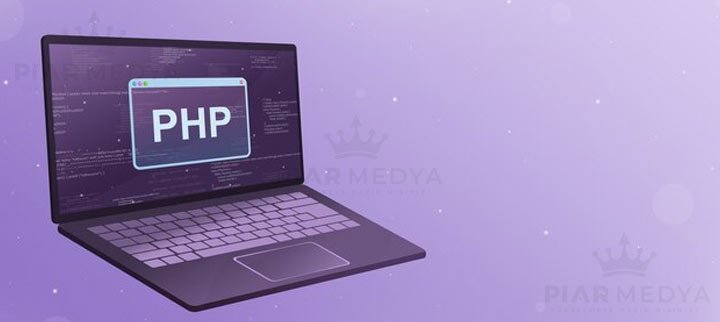What is PHP? 10 Popular Features That Make PHP Special
PHP stands for Hypertext Preprocessor. It is a server-side scripting language used for web development. Learn about its detailed features. You will find answers to all your questions related to topic What is PHP? 10 Popular Features That Make PHP Special in the continuation of the text.

What is PHP?
How does PHP work?
What are the features of PHP?
What Can Be Done with PHP?
Advantages: 10 Great Features That Make PHP Special
Tips for Learning PHP
In Summary
What is PHP?
PHP stands for Hypertext Preprocessor. It is a server-side scripting language used for web development. PHP is used to develop dynamic websites and web applications. It is an important tool for web projects where users can interact, data can be processed, and dynamic content can be delivered.
The Hypertext Preprocessor (PHP) was developed by Rasmus Lerdorf in 1994. Initially, it was used to develop his personal website. Later, the potential of PHP was recognized and it began to be widely used for web development.
How does PHP work?
PHP is a server-side scripting language. This means that PHP code is interpreted by a PHP processing module on the web server, producing a web page as output. PHP code can be embedded within HTML code or saved in a separate file.
What are the features of PHP?
PHP has many features such as:
- It is simple and easy to learn.
- It is versatile.
- It is performant.
- It is open-source.
- It has extensive library and plugin support.
What Can Be Done with PHP?
PHP is quite popular in the web development world and can be used for developing various applications and functions. Some basic and advanced tasks that can be done with PHP include:
- Creating Dynamic Web Pages: It can work within HTML code and dynamically change content based on user interactions. This means you can update content based on user inputs, database queries, or other conditions.
- Database Operations: It can easily integrate with popular databases like MySQL, PostgreSQL, Oracle, and Microsoft SQL Server. This enables database management, data insertion, update, deletion, and querying operations.
- User Session Management: You can create user sessions to manage users and control sessions in web applications. This includes allowing users to log in, log out, and maintain their information during sessions.
- E-Commerce Sites: You can develop e-commerce features like shopping cart functions, product management, payment processing, and customer management using PHP.
- Form Processing and Validation: You can use PHP to process, validate, and store form data submitted by users.
- Sending Emails: PHP supports email sending functionalities to communicate with users, send notifications, or manage responses from forms.
- API Integration and Development: By integrating with various APIs or developing your own API using PHP, you can exchange data and interact with third-party services.
- Templates and CMS Development: Content management systems and various web templates like WordPress have been developed with PHP. You can create your own templates or CMS using PHP.
- Security Operations: It supports security measures such as data encryption, protection against XSS and CSRF attacks, and firewall rules.
- Background Processes and Automation: You can create various background tasks and automation scripts on the server side.
Advantages: 10 Great Features That Make PHP Special
PHP is today one of the world's most popular web development languages. The world's most popular content management systems like WordPress, Joomla, and Drupal are written in PHP.
It is also used in e-commerce sites, social media platforms, and many other web applications. We can list some of PHP's significant advantages over other programming languages as follows:
- Designed for Web Development: It is a language designed from the ground up for web-based applications and sites. Therefore, it has a natural advantage in areas such as integration with HTML, operations with the HTTP protocol, and interaction with web servers.
- Easy Learning Curve: The syntax of PHP is easy to understand for beginners and allows them to become productive quickly. Compared to some other languages, developing basic web applications with PHP can be achieved rapidly.
- Extensive Server and Hosting Support: It is supported by nearly all web hosting providers and is usually included in hosting packages. This allows for the widespread and easy deployment of PHP-based applications.
- Rich Function Library: It has a wide set of functions for string operations, database interactions, file operations, and more. These functions facilitate performing various tasks.
- Database Integration: PHP provides easy integration with various databases such as MySQL, PostgreSQL, Oracle, Microsoft SQL Server. This is a significant advantage in the development of database-intensive web applications.
- Flexibility: PHP supports both procedural and object-oriented programming (OOP) styles, giving developers flexibility for various projects.
- Large Community and Resources: There is a large and active user community. This means access to a wide range of resources such as online forums, tutorials, and ready-made code snippets.
- Open Source and Free: PHP is a free and open-source language. This means you can use it without paying any license fees and customize the source code as needed.
- Platform Independence: It can run on Linux, Windows, MacOS, and other operating systems, which facilitates the easy deployment of applications across different environments.
- Strong Framework Support: Many popular and powerful frameworks based on PHP, such as Laravel, Symfony, CodeIgniter, enable rapid and efficient web application development.
Other Popular Features of PHP:
In addition to the features mentioned above, other popular features of PHP include:
- Object-oriented programming (OOP) support: It supports Object-oriented programming (OOP). OOP is a programming paradigm that facilitates the development of complex web projects.
- Cache support: It has cache support. Cache is a technique used to improve the performance of websites and web applications.
- Security: PHP has a good reputation for security. It includes various measures to prevent security vulnerabilities.
Tips for Learning PHP
If you want to learn PHP, you can follow these suggestions:
- Learn the basics. Before you start learning PHP, you need to understand the basic concepts. These include variables, expressions, loops, conditional statements, and functions.
- Practice. The best way to learn PHP is by practicing. You can take PHP lessons from online resources or courses, or use PHP in your own projects.
- Join the community. The PHP community is a great resource for learning and improving your PHP skills. By joining the community, you can learn from other PHP developers and ask questions.
In Summary
In summary, PHP is a powerful and flexible language for web development. It is suitable for both beginners and experienced developers in web development. The main reasons for PHP's popularity include its simple syntax, powerful and flexible structure, and its applicability in almost every area of web development.
FREQUENTLY ASKED QUESTIONS (FAQs)
It runs on all common platforms such as Windows, Linux, macOS, and Unix. PHP is also compatible with popular web servers like Apache, Nginx, and IIS.
It is one of the world`s most popular web development languages. The world`s most popular content management systems, such as WordPress, Joomla, and Drupal, are written in PHP. It is also used in e-commerce sites, social media platforms, and many other web applications.
It continues to be a powerful and flexible language for web development. The PHP community is constantly improving PHP. It will remain a popular language for web development in the future.
Basic computer skills and mathematical skills are required to learn PHP. Additionally, you need to learn the fundamentals of web development, such as HTML and CSS.
The time you need to devote to learning PHP depends on your level of knowledge and learning speed. You should spend a few weeks or months to learn the basics of PHP. More time is required to develop more complex projects with PHP.
There are many benefits to learning PHP. By learning PHP, you can:
- Improve your web development skills.
- Develop your own websites and web applications.
- Find jobs in the web development sector.






